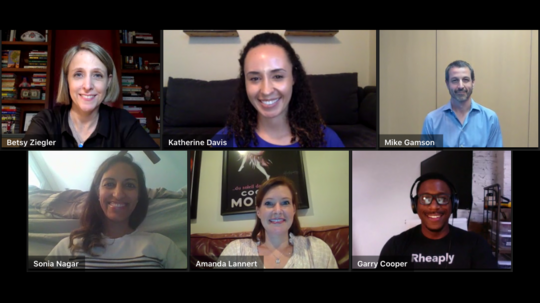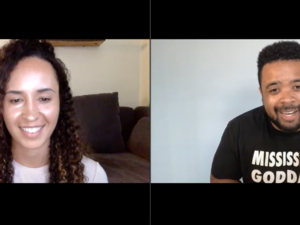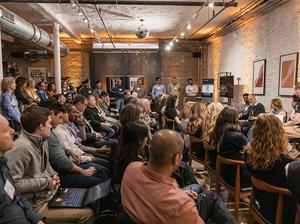
When Chicago Inno first scheduled its virtual Future of Work event, the topic of the panel was designed around how companies in Chicago are envisioning the workplace in light of a global pandemic. Then, George Floyd tragically died in police custody in Minneapolis, and suddenly the conversation around the "future of work" was not just about returning to the office post Covid, but how do businesses across Chicago, and the country, talk about issues of structural racism and bias, and how companies can make the workplace more diverse and equitable for all employees.
The virtual panel, which took place Wednesday afternoon, featured a collection of high-profile business leaders in Chicago's tech and startup scene. Moderated by Amanda Lannert, the CEO of Jellyvision, the panel included Betsy Ziegler, the CEO of 1871; Garry Cooper, the CEO at Rheaply; Mike Gamson, the CEO of Relativity; and Sonia Nagar, a partner at Pritzker Group Venture Capital.
Lannert set the tone early on, noting how this "pressure cooker of a year" is going change perceptions and behaviors around work for years to come---not only because of shifting workplace norms due to the coronavirus, but also due to protests happening around the country.
"These protests have forced a lot of leaders to look in the mirror and realize that inaction is complicity," Lannert said. "So in the meantime, we are trying to create systemic changes in our organizations. These are uncomfortable times but discomfort is where the growth happens."
Two specific areas of change mentioned during the event include a new 1871 accelerator program focused on Black founders, Ziegler said. The yet-to-be-announced program would be along the lines of 1871's WiSTEM program for female founders and the LatinX incubator it runs with the Illinois Hispanic Chamber of Commerce, but feature different leaders and mentors.
In addition, Cooper, the CEO of Chicago startup Rheaply, said he and other founders of color in Chicago are working on an initiative to hold investors accountable for investing in startups with diverse entrepreneurs.
"I think it's important for me, as a Black founder, to be very open and vulnerable about the things I’m going through to my team and to the community at large," Cooper said. "Before, there were reasons why I, or people like me, wouldn't say the things we think or feel. I think those days are gone."
"I'm really enjoying having dinner with my family seven nights a week, instead of two."
Nagar, a principal at Pritzker Group VC, said there's "no doubt that venture capital has a lot of work to do," particularly around hiring more Black general partners and having more people of color in the pipeline.
"We need to be thoughtful about who we're hiring at the early levels, and at the GP level," she said.
Other topics discussed included the importance of valuing your employees' mental health during challenging times, things that have surprised leaders about the way businesses have responded to Covid, and lessons learned during this time that will be brought back to the workplace after the virus is gone.
An increase in remote work, more workplace flexibility, and a better work-life balance were all things panelists predicted will continue long after the coronavirus.
"I'm really enjoying having dinner with my family seven nights a week, instead of two," Lannert said. "Which is what I told myself I needed to do to be a CEO of a tech company."
Cooper said he's encouraged his team to be more open and transparent during this time, and has tried to move all of his startup's communication to open Slack channels where everyone in the company can see what's going on.
Gamson, the CEO of Relativity, said Covid has made him more open-minded about remote work and what a "typical" workday looks like.
"I really do feel like the world has proven an experiment that we never would have had the courage to take...unless we were forced to," Gamson said. "The world has really proven that many more jobs and many more industries can be extraordinarily effective remotely. And it's going to be very difficult to prove to a generation of employees who are coming up that the old way of doing things is best, when the proof right now would suggest otherwise."
To watch the full recap of yesterday's event, check it out here.
Thanks to our sponsor Flatiron School! About Flatiron School: Tech's most innovative companies in Chicago need your talent. Flatiron School provides a fast-track to the skills you need for a new career in software engineering, data science or cybersecurity in as little as 12 or 15 weeks. Learn more about their programs at flatironschool.com.







